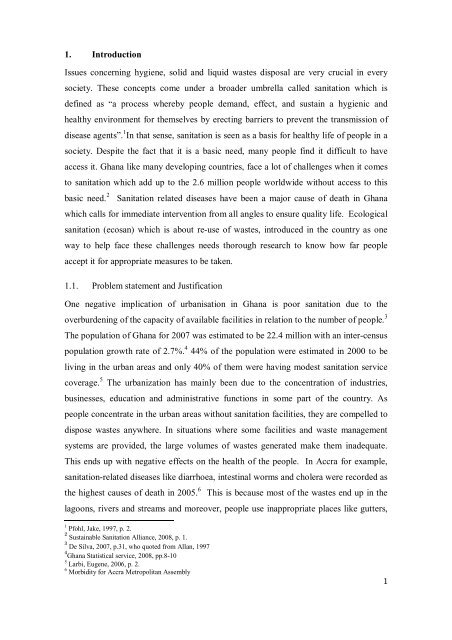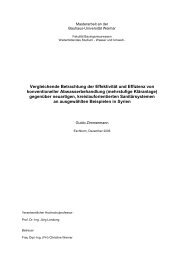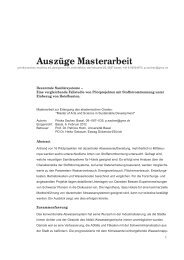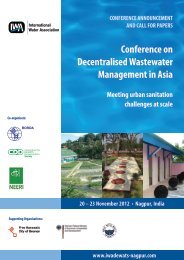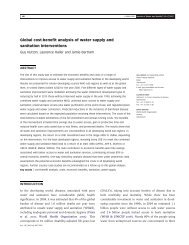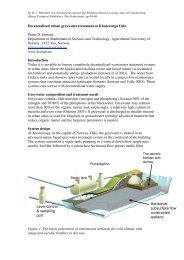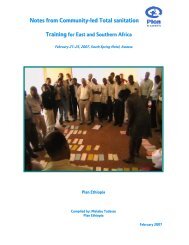A QUANTITATIVE APPROACH TO PREDICT ... - SuSanA
A QUANTITATIVE APPROACH TO PREDICT ... - SuSanA
A QUANTITATIVE APPROACH TO PREDICT ... - SuSanA
You also want an ePaper? Increase the reach of your titles
YUMPU automatically turns print PDFs into web optimized ePapers that Google loves.
1. Introduction<br />
Issues concerning hygiene, solid and liquid wastes disposal are very crucial in every<br />
society. These concepts come under a broader umbrella called sanitation which is<br />
defined as “a process whereby people demand, effect, and sustain a hygienic and<br />
healthy environment for themselves by erecting barriers to prevent the transmission of<br />
disease agents”. 1 In that sense, sanitation is seen as a basis for healthy life of people in a<br />
society. Despite the fact that it is a basic need, many people find it difficult to have<br />
access it. Ghana like many developing countries, face a lot of challenges when it comes<br />
to sanitation which add up to the 2.6 million people worldwide without access to this<br />
basic need. 2 Sanitation related diseases have been a major cause of death in Ghana<br />
which calls for immediate intervention from all angles to ensure quality life. Ecological<br />
sanitation (ecosan) which is about re-use of wastes, introduced in the country as one<br />
way to help face these challenges needs thorough research to know how far people<br />
accept it for appropriate measures to be taken.<br />
1.1. Problem statement and Justification<br />
One negative implication of urbanisation in Ghana is poor sanitation due to the<br />
overburdening of the capacity of available facilities in relation to the number of people. 3<br />
The population of Ghana for 2007 was estimated to be 22.4 million with an inter-census<br />
population growth rate of 2.7%. 4 44% of the population were estimated in 2000 to be<br />
living in the urban areas and only 40% of them were having modest sanitation service<br />
coverage. 5 The urbanization has mainly been due to the concentration of industries,<br />
businesses, education and administrative functions in some part of the country. As<br />
people concentrate in the urban areas without sanitation facilities, they are compelled to<br />
dispose wastes anywhere. In situations where some facilities and waste management<br />
systems are provided, the large volumes of wastes generated make them inadequate.<br />
This ends up with negative effects on the health of the people. In Accra for example,<br />
sanitation-related diseases like diarrhoea, intestinal worms and cholera were recorded as<br />
the highest causes of death in 2005. 6 This is because most of the wastes end up in the<br />
lagoons, rivers and streams and moreover, people use inappropriate places like gutters,<br />
1 Pfohl, Jake, 1997, p. 2.<br />
2 Sustainable Sanitation Alliance, 2008, p. 1.<br />
3 De Silva, 2007, p.31, who quoted from Allan, 1997<br />
4 Ghana Statistical service, 2008, pp.8-10<br />
5 Larbi, Eugene, 2006, p. 2.<br />
6 Morbidity for Accra Metropolitan Assembly<br />
1


